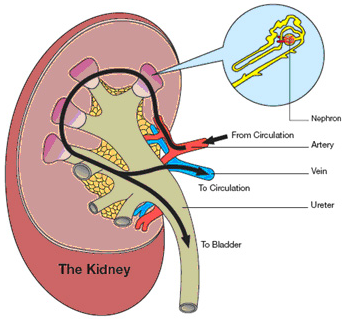What Causes Kidney Failure
2013-10-07 15:59
 Kidney failure is that kidneys have been damaged partially or completely. Kidney can not work effectively as usual. Normal kidney can expel excessive water and metabolic waste out the blood, and it can keep the balance of electrolyte and acid-base. Also, kidney can secrete hormones and regulate blood pressure. If kidneys are damaged, they can not play an effective function.
Kidney failure is that kidneys have been damaged partially or completely. Kidney can not work effectively as usual. Normal kidney can expel excessive water and metabolic waste out the blood, and it can keep the balance of electrolyte and acid-base. Also, kidney can secrete hormones and regulate blood pressure. If kidneys are damaged, they can not play an effective function.
What causes kidney failure?
Kidney failure is caused by one or more diseases. Diabetes and high blood pressure are the most common causes of kidney failure.
Diabetes is the most common cause of kidney failure. It can increase the burden of kidneys. In the Untied States, nearly 24 million people have diabetes, and almost 180,000 people are living with kidney failure due to uncontrolled diabetes.
Another common disease is high blood pressure. High blood pressure accounts for over 25% of all cases of kidney failure. High blood pressure causes damage by putting strain on the small blood vessels in kidneys, leading to worsening of kidney function.
In addition, there are some other diseases causing kidney failure, such as:
* glomerulonephritis: it is a inflammation of kidney. Glomerulonephritis can damage the tiny filters inside the kidneys.
* pyelonephrits: it is an infection in the kidney. If pyelonephrits is not treated, it can get worse and cause permanent kidney failure.
* systemic lupus erythematosus: lupus is an autoimmune condition and it can affect many parts of the body including kidneys.
* polycystic kidney disease: it is an inherited disease which can enlarge kidneys and cause kidney failure.
In conclusion, many diseases can cause kidney failure. If you suffer from above-mentioned diseases, you need to take treatment in time. Otherwise, these diseases can become worst and cause kidney failure.
- Tag: Kidney Failure Causes
- Pre: Diet For Patients With Stage 4 Kidney Failure
- Next: Can Coconut Oil Be Used to Treat Kidney Failure
